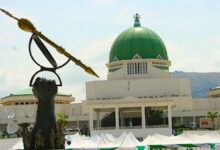Electricity: From Darkness To Darkness In Nigeria

The power situation in Nigeria is one that needs prayer and serious commitment from the government in power to permanently resolve, as the country faces erratic supply.
Despite the trillions of naira so far injected, there is no commensurate improvement, due to corruption, impunity, vandalization of gas pipelines and other acts of restiveness.
The reforms in the Nigeria Electricity Supply Industry (NESI) may not yield the anticipated results largely due to corruption, impunity of perpetrators, regulatory lapses and policy inconsistencies.
It is estimated that over thirteen (13) trillion naira has been injected to better the sector starting from the return to democracy in 1999 to date, and may reach over twenty (20) Trillion naira.
Just recently, the Central Bank of Nigeria (CBN) disclosed while Briefing newsmen shortly after its Monetary Policy Committee (MPC) meeting in Abuja that it “disbursed ₦11.11 billion to power sector players, under the Nigeria Bulk Electricity Trading Payment Assurance Facility (NBETPAF), bringing the cumulative disbursements under this facility to ₦1.28 trillion”.
The apex bank said, “the sum of ₦12.64 billion was also released to Distribution Companies (DisCos) under the Nigeria Electricity Market Stabilisation Facility – Phase 2 (NEMSF-2). The cumulative disbursement under the NEMSF-2 thus stood at ₦232.93 billion.
“Both interventions were designed to improve access to capital and ease the development of enabling infrastructure in the Nigeria Electricity Supply Industry”.
Unfortunately, despite this huge amount, darkness continues to envelope the entire country with business owners relocating to neighbouring countries like: Cameroon, Benin Republic, Niger Republic, and Ghana.
Yes, with this huge financial intervention, nothing has changed. The country is bedeviled with energy poverty, so much so that only about 55% of over 200 million people in Nigeria have access to electricity,
Of course, reliable electricity would boost the economy of the country. Reliable electricity allows businesses to operate productively and generate jobs.
Access to electricity is also essential to support vital community services such as hospitals, health clinics and schools. Electricity powers street lights to improve safety and increase business activities.
Politics has prevented Nigerian government from allowing the free flow of market by ensuring cost reflective tariffs. This has created liquidity issue and reduced investments in the sector.
Due to non-availability of power, many businesses have shut-down while those that survive do so at high costs, which can not support large scale patronage.
The consumer population in Nigeria is so huge and unmeterd. Most consumers are unhappy with their billing methodology and feel short-changed by the operators.
Billings do not reflect the actual electricity consumptions in most cases. DisCos officials are very corrupt that they demand gratification from customers before they do their jobs.
Indeed, the power sector problems in Nigeria are partly due to wasteful generation, weak transmission with persistent system collapses, low distribution capacity, poor gas supply, vandalization of gas pipelines, insufficient meters, government interference, amongst others.
Our stand is that government should demonstrate the needed political will to change the narrative. The power sector should be populated by people with requisite skills for the overall growth of the economy.





